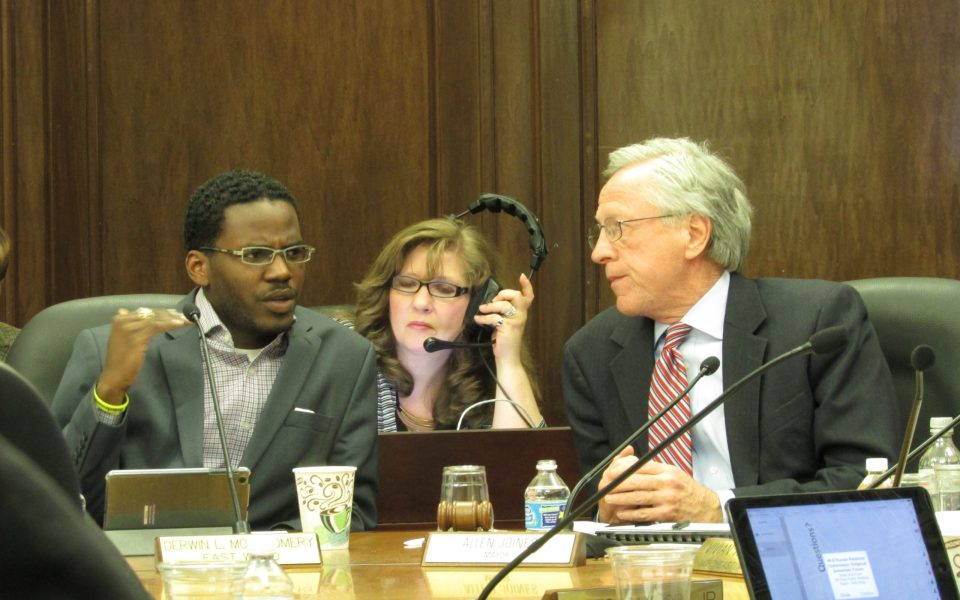A sneak peak at the city of Winston-Salem’s 2018-2019 budget reveals a $1.7 million gap. Meanwhile, the finance committee forwards a recommendation for $147,834 in incentives to a banking payments company.
Based on an early forecast, the city of Winston-Salem’s annual budget will grow by $8.4 million, to $208.4 million for fiscal year 2018-2019.
The forecast presented by Budget Director Patrice Toney to members of Winston-Salem City Council on Monday indicated that almost half of the $8.4 million growth will be driven by $4 million in increased spending on employee compensation. Other new expenses include spending on new facilities, including the Union Station transportation center, personnel for the newly acquired Long Creek swimming pool; a local match for a federal grant to train firefighters; and replacement of sanitation bins.
The city also anticipates an increase in revenue, including an additional $2.4 million in property taxes that assumes 1.3 percent growth in the city’s tax base. With a $2 million fund balance appropriation, the city faces a $1.7 million gap — less than 1 percent of the total budget.
“I haven’t gotten much pushback on the bonds because people see that they’re going towards built projects,” said Councilman Jeff MacIntosh, who represents the Northwest Ward. “I get a lot of pushback from constituents year to year on how much we’re spending on operations. What are the areas where we can substitute technology?… To me, this budget needs a lot of work, or else we’re gonna go up in property taxes and fees, and get a lot of heat from the citizens.”
MacIntosh said after the meeting that it’s city council members responsibility to push staff to find more efficiency in the budget.
“Our tax rate is growing faster than our population,” he said. “Without someone saying, ‘You’ve got to squeeze more blood out of the rock,’ that’s not going to happen,”
The $4 million increase in employee compensation includes a 2 percent average merit increase for eligible employees, a 2 percent public safety supplement and a raise in the minimum wage for city workers to $12.50 per hour.
Two factors create uncertainty for the budget.
The city’s human resources department is currently undertaking a compensation study. The results are expected soon, and could drive additional costs.
“They will look at some internal equity and external competitiveness [factors],” Toney said. “They’re also looking at a framework for achieving a minimum pay of $15 per hour by the year 2021, and they are updating the job descriptions for all the positions.” Toney said the study is primarily looking at “administrative department head type of positions” and police positions.
“There’s not a number in the budget right now for this estimate,” City Manager Lee Garrity cautioned, “but it will be significant.”
Toney also said the city anticipates receiving new projections for property tax revenue from the Forsyth County Tax Department, which could change budget projections.
Toney resented a cash-flow projection for the city’s stormwater management fund, which indicates that without a rate increase, additional borrowing or a combination of the two, the fund will be depleted by 2023.
Assistant City Manager Greg Turner said the projection is based on a couple looming projects that will incur significant expenses, including replacing a storm sewer along Seventh Street.
The next meeting on the budget is scheduled for April 2 at City Hall.
In other news on Monday, the finance committee unanimously approved a recommendation to provide up to $147,834 in economic incentives assistance to the Clearing House, a banking association described on its website as “a quasi-central bank long before the Federal Reserve was formed” that facilitates payments between banks. The company currently employs about 175 people at its Winston-Salem facility. The outlay of public funds is premised on the company’s commitment to invest about $25 million in facility improvements, equipment and software, and to create 50 new jobs with average salaries of $98,361 plus benefits. The amount of the incentives is 50 percent of anticipated net new property tax generated by the project over its first five years.
The request goes before the full council for consideration on March 5.
“I know this isn’t a done deal,” MacIntosh said at the meeting, “but I just want to say thanks for giving us a shot at the deal. This seems like exactly the type of business we want to have grow here: clean business, good wages, intelligence workers, a diverse workforce. We really appreciate having a shot at it, and we’re excited that you’re going to do your expansion here.”
Join the First Amendment Society, a membership that goes directly to funding TCB‘s newsroom.
We believe that reporting can save the world.
The TCB First Amendment Society recognizes the vital role of a free, unfettered press with a bundling of local experiences designed to build community, and unique engagements with our newsroom that will help you understand, and shape, local journalism’s critical role in uplifting the people in our cities.
All revenue goes directly into the newsroom as reporters’ salaries and freelance commissions.


Leave a Reply